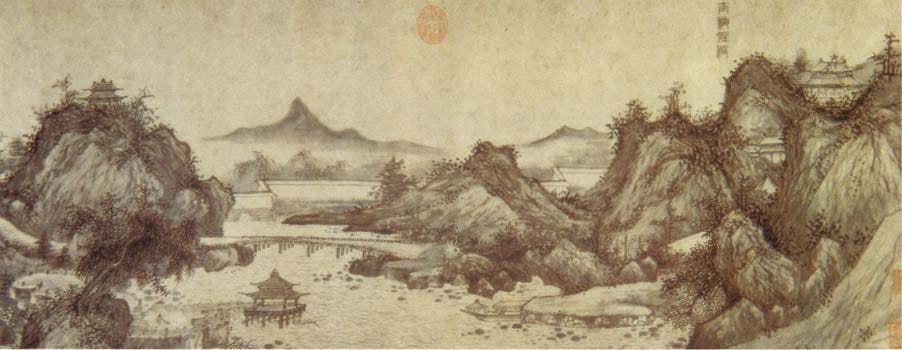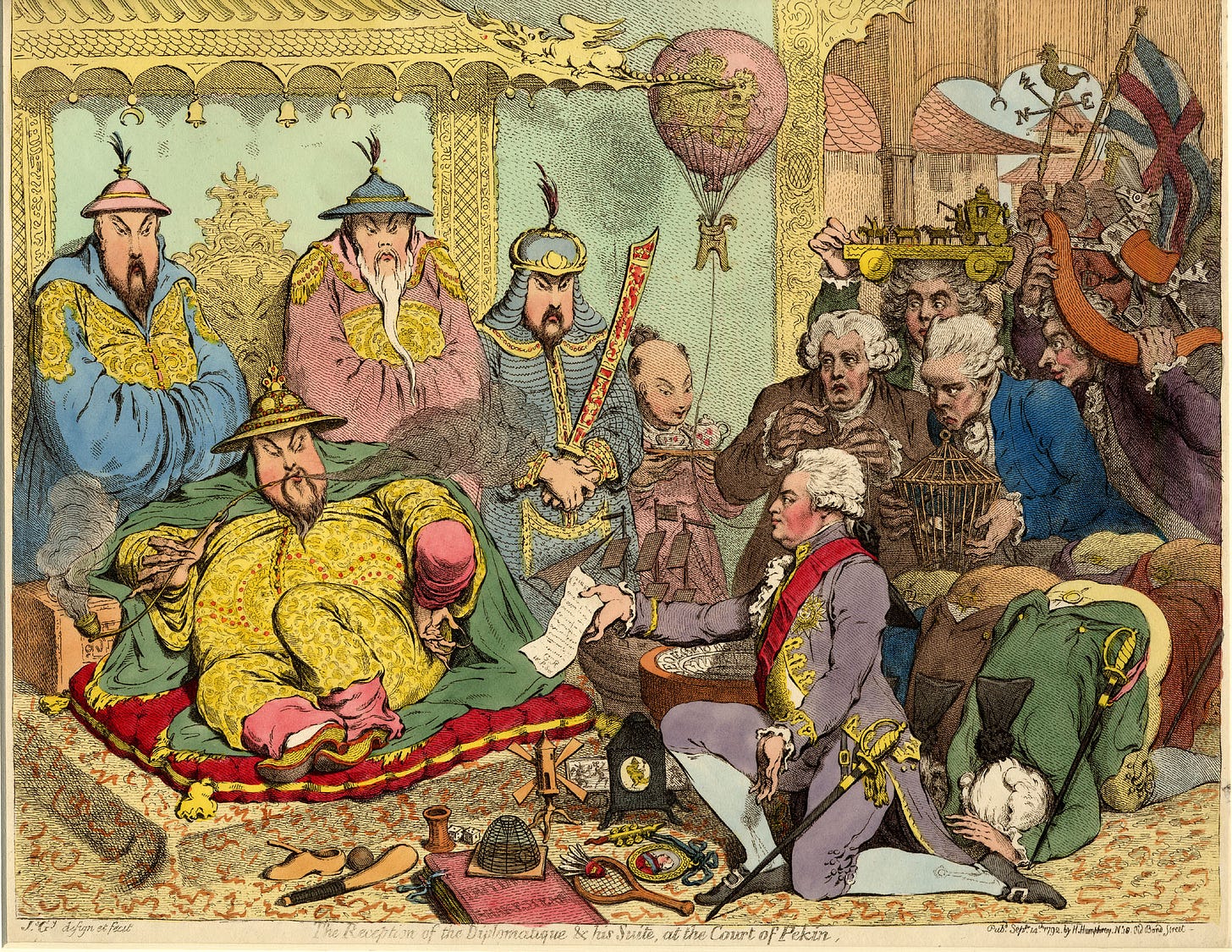From Claire—We think this is our best Cosmopolicast yet.
Do you remember Adam Garfinkle’s debate with Vivek about China, the 7th Fleet, and the future of US power? We brought Adam on the podcast to discuss this, and Henry Hill joined us. Is Chinese global hegemony inevitable? Vivek says yes. Adam says no. Who’s right?
We ask what the Chinese regime is really all about: Is it Marxist? Leninist? Maoist? Neo-totalitarian? Revanchist? Nationalist? Imperialist? How well does the West understand China? How well does China understand the West? What does China want? When does China want it? What should we do about it? Who would win a war for Taiwan? What would happen if the US didn’t fight—or lost? Is the US overreacting?
Do you agree it’s our best podcast? We’re genuinely keen to know. I’m new to podcasting and don’t quite trust my instincts about what’s good and what’s not. If we all enjoyed the conversation, does that mean it was a great podcast? Or might it just be that we’re all terribly fond of each other and haven’t spoken for a long time? Your thoughts would truly be useful for us in structuring and editing future Cosmopolicasts.
Also, when do you listen to podcasts? Why do you listen to them? What do you look for in deciding which podcasts to download? Do you prefer hearing more of us or fewer on a show? What’s the ideal podcast length? Any technical advice, or suggestions about the format?
The more you tell us what you’d like, the better we can make you happy.
The Cosmopolitan Globalists are reading …
Here’s a list of the books and essays we discussed, along with a few we didn’t. If you’d like to suggest further reading, tell us in the comments and we’ll update the list.
Newsletters
Ananth Krishnan’s India-China newsletter.
Bill Bishop’s Sinocism, “the presidential daily brief for China hands.”
Articles, reports, speeches
The essential Document No. 9, or the Communiqué on the Current State of the Ideological Sphere. From the introduction to ChinaFile’s translation:
[M]any of the actions taken and techniques used under [Xi’s] leadership suggest a return to ideas and tactics that hark back to the days of Mao Zedong. One such signal came during this past spring, when reports began to appear that the Party leadership was being urged to guard against seven political “perils,” including constitutionalism, civil society, “nihilistic” views of history, “universal values,” and the promotion of “the West’s view of media.” It also called on Party members to strengthen their resistance to “infiltration” by outside ideas, renew their commitment to work “in the ideological sphere,” and to handle with renewed vigilance all ideas, institutions, and people deemed threatening to unilateral Party rule. These warnings were enumerated in a communiqué circulated within the Party by its General Office in April, and, because they constituted the ninth such paper issued this year, have come to be known as “Document 9.”
The Chinese authorities accused dissident journalist Gao Yu of leaking the document and sentenced him to seven years in prison. He paid a harsh price to tell you what Document 9 says, so do read it.
The Fourteenth Five-Year Plan for the National Economic and Social Development of the People’s Republic of China and the Outline of Long-Term Goals for 2035. (Owen—Google Translate does a good job with it. Very interesting to skim. If it weren’t for the other things, like genocide and taking over the world, I’d be pretty excited to see a plan like that. It gives the sense that the future will be better for China than its present or past. I wish the West had more of that attitude.)
Engineers of the Soul: Ideology in Xi Jinping’s China. Transcript of a speech by John Garnaut, an Australian journalist who used to cover China, then joined the Australian government as a China policy advisor. He led the response to China’s influence campaigns in Australia.
Implementing Grand Strategy Toward China: Twenty-two US Policy Prescriptions, by Robert D. Blackwill for the Council on Foreign Relations.
The Problem with Friendship, by Frank Lavin. “China and the United States have both arrived at roughly the same position, albeit by different paths.”
The Sino-American rivalry in cultural context, by Adam himself.
Books
A Billion Voices: China’s Search for a Common Language, by David Moser.
Inside the Mind of Xi Jinping, by François Bougon.
Asia’s Cauldron: The South China Sea and the End of a Stable Pacific, by Robert Kaplan.
Chaos Under Heaven: Trump, Xi, and the Battle for the Twenty-First Century, by Josh Rogan.
By More Than Providence: Grand Strategy and American Power in the Asia Pacific Since 1783, by Michael Green. (This is the book you want if you’re looking for a comprehensive survey of the history and major themes of American foreign policy in Asia.)
The Opium War: Drugs, Dreams and the Making of China, by Julia Lovell.
The Ibis Trilogy, by Amitav Ghosh, a fictional saga that takes place at the outbreak of the first Opium War.
Video
François Bougon discusses his biography of Xi. If you don’t understand French, click the gear icon, choose “Subtitles,” then pick your target language. You may also have to fiddle with the CC button, left of the gear icon.
Would you kindly try that and let us know how well it works? Is it easy to get subtitles in your target language? Is the translation good enough for you to enjoy it? We hope so, because we’d like to make foreign-language broadcast news and analysis like this a a regular feature.
Advances in machine translation have been revolutionary in the past few years, so much so that suddenly, we’ve got an open window into cultures and societies that only recently were severely inaccessible—geographically, politically, linguistically.
So far, it doesn’t seem many people have fully understood this, which is why we plan to build an International News Translation Superhighway. If you’re new here, take a moment to read that proposal. Don’t you think it’s a great idea? If you do, please subscribe. That’s what we’ll use your money for.
As you can see from this interview, Francophone television shows about foreign affairs are often much better than their Anglophone equivalents. They’re more serious, generally more in-depth, and above all, they exist in the first place. If you can muddle along with the subtitles and if you find the quality of the translation satisfactory, we’ve got lots of interesting debates and discussions—from all over the world—we can share with you.
Behind the Cosmopolitan Globalist editorial curtain:
We thought of this after we finished recording:
Claire: Hey, I’ve always thought the Opium Wars deserve a riveting, historically accurate, multi-part documentary on Netflix suitable for compulsive binge-watching. Why hasn’t anyone made one, I wonder? As far as I know, there’s been never been any treatment of it in film or television. But it has everything—war, dramatic personalities. You could have incredible sets. Might it be because it would inflame Chinese sentiment, and China’s the biggest consumer market?
Monique: That’s precisely why they haven’t produced one yet. Unfortunately.
Claire: I don’t see why it need offend them, though. A historically accurate account would confirm their aggrieved worldview. They were genuinely aggrieved. Maybe we should do it in-house?
Vivek: Go for it. It’s a shameful episode in history, one where none of the players smell of roses. Many an Indian business house owes its initial monies to the trade, as do many hongs in Hong Kong, like Jardine Matheson, the Sassoons, Barings. Instead of a film, why don’t we do it like a BBC 4 radio series? A lot less expensive. And still leaves scope for a screen series in the future.
Claire: We wouldn’t have the glorious costumes and sets.
Vivek: There’s quite a bit of material on the Opium Wars and trade during that period available at the Asiatic Library in Mumbai. Much of it focuses on the Indian businessmen who built their fortunes during those times in cahoots with the British. Some of these were business houses like the Tatas! And there’s an extensive collection of papers in some of Kolkata’s libraries that illustrate what the British grandees did. Once this Covid thing is over, I’ll get as much of it as I can for you if you’re interested. The Opium Wars are a fascinating bit of history. Often ignored.
He’s right. Too often ignored. Would you enjoy a riveting, historically accurate, multi-part Opium Wars Cosmopolicast? Let us know.
The Aftercast
After Henry signed off and we said, “It’s a wrap,” we kept talking about America, the Woke mobs, the catastrophic irresponsibility of the academy, and the decline of deep literacy. Fortunately, Monique kept recording, because we ended up with a second podcast’s worth of discussion. If you’d like to hear it, let us know. We’ll fix it up and post it.
The Cosmopolitan Globalist book club
Would you like to join a discussion group with us based on our China reading list? Maybe once a week? Because we could organize that. It could be really interesting. Who would join us if we did?
Finally: Isn’t this a great newsletter? Don’t you think the Cosmopolitan Globalist is going in the right direction? We’d really love it if you subscribed. I know we say that every time, but every time we ask, someone does subscribe, and we love it. We genuinely celebrate every new subscription. Politely asking you to subscribe seems to work, so we’re just going to keep asking. Politely. Would you please subscribe? Don’t you think our venture is worth supporting?
If you especially love us, you could also become a Supersubscriber. It’s wonderful when you do that.
If you can’t subscribe right now, that’s fine. Keep enjoying the newsletter. But would you kindly forward the Cosmopolicast to your friends, asking them to send it to their friends? And ask them to sign up, too? We’ve noticed that people who sign up tend, sooner or later, to subscribe, so we celebrate every new sign-up, too.
Thanks, everyone!
Today’s newsletter was brought to you by Supersubscriber Jeffrey Stein. Thank you, Jeffrey!

















Share this post